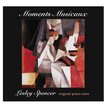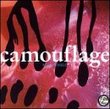| All Artists: Anton Webern, Pierre Boulez, Berliner Philharmoniker, Emerson String Quartet, Ensemble InterContemporain, BBC Singers, Francoise Pollet, Christiane Oelze, Krystian Zimerman, Gidon Kremer Title: Complete Webern [Box Set] Members Wishing: 4 Total Copies: 0 Label: Deutsche Grammophon Original Release Date: 1/1/2000 Re-Release Date: 5/9/2000 Album Type: Box set Genres: Dance & Electronic, Classical Styles: Opera & Classical Vocal, Ballets & Dances, Dances, Chamber Music, Forms & Genres, Concertos, Sonatas, Historical Periods, Baroque (c.1600-1750), Modern, 20th, & 21st Century, Instruments, Keyboard, Strings, Symphonies Number of Discs: 6 SwapaCD Credits: 6 UPCs: 028945763729, 028945763729 |
Search - Anton Webern, Pierre Boulez, Berliner Philharmoniker :: Complete Webern [Box Set]
![Complete Webern [Box Set]](https://nationalbookswap.com/cd//l/47/8147/6108147.jpg) | Anton Webern, Pierre Boulez, Berliner Philharmoniker Complete Webern [Box Set] Genres: Dance & Electronic, Classical Pierre Boulez's Complete Webern Edition appears just over two decades after his last traversal. Well, it's not literally complete, but does have enough early works to set the mature ones in the right context. These day... more » |
Larger Image |
CD DetailsSynopsis
Amazon.com Pierre Boulez's Complete Webern Edition appears just over two decades after his last traversal. Well, it's not literally complete, but does have enough early works to set the mature ones in the right context. These days, Webern is no longer seen so much as a new music guru as he is a major composer, pure and simple--his expression as concise as it is intense. Performancewise, there's a quality of musicianship here that few previous recordings have matched; familiarity with the idiom certainly plays its part, but so does Boulez's belief that what we're hearing needs to be presented with conviction. Try the Passacaglia, sensuous music that combines the soundworld of Brahms and Mahler, or the string quartet or orchestra pieces--miniatures in duration, but whole dramas of expression.Ease of performance doesn't always make this music easy to come to grips with: the song cycles need several listenings to grasp the meaning behind the compression, while the later instrumental and choral works have a luminous austerity that looks back to Bach and beyond to Renaissance masters such as Schütz and Isaac. While much of Webern's music has long been admired, only now is it becoming possible to respond to it through the heart as well as the brain. This set, superbly packaged and comprehensively documented, marks a major step forward, and deserves investigating by anyone keen to appreciate something of the music's quiet, calm essence in an often strident, dislocated century. --Richard Whitehouse Similar CDs
|
CD ReviewsThank You Boulez Jack Jones | Woodland Hills, CA United States | 10/22/2001 (5 out of 5 stars) "If you are a fan of the "New Vienna School" (Schoenberg, Berg, Webern) or 20th century "classical" or "serious" music, this disk set is very rewarding. Beautifully recorded and packaged, and with equally good liner notes, it is a treat to strap on the headphones and listen.I debated between buying this or Boulez's older Webern set and went with this one. There is much more music on this set because pieces without opus numbers are included. They lend a lot of insight into his "published" works. I also went with this set because it is a modern digital recording, the previous set being from the early 70's. I will often side with a classic recording when needed-performance over sound. Here, I'm happy to report, the listener gets both. Every detail is captured.Thank you very much Pierre Boulez and DG for making this project happen. Please keep the Schoenberg and Berg disks coming. And thank you Anton Webern for continually opening my ears." 5 Star music. Some very good performances, some are aimless. S. C Rice | 08/25/2001 (5 out of 5 stars) "Webern's music demonstrates a level of craft, in which few composers ever contend. The more that I listen to the works of Webern, the more I hear that each note must be just as it is. There is nothing wasted in this music. The expression is never vague, always intense. I do admire the works of many modern composers, but few are so discerning and meticulous in their works. Webern's craft is equal with the greats of music history; Guillarme de Machaut, Carlo Gesualdo, Claudio Monteverdi, J.S. Bach, Franz Joseph Haydn, Ludwig Beethoven. He is a towering figure. The music that is played here is first rate. However, I have not yet heard performances of many of his works that bring out everything that Webern's music has to offer. For example, the Op. 27 Piano Variations are seldom done justice. All of the movements are given `circa' tempo indications, but many take the movements much slower or faster than indicated. Unfortunately, on this recording the fast movement is slow and the slow movements fast. Presumably the slower tempo in the fast movement would allow for more accurate interpretation of the frequent changes between piano and forte. The problem is that the F's typically don't fade away fast enough and drown out the P's. The other option is to make the P's a little bit more like mezzo forte's. The recording that Pollini did of the work on Deutsche Gramaphon with the Boulez 2nd Sonata manages to reconcile the dynamics with the tempo. However, what I have not heard with the work is the full impact of the affect in the work. What the Pollini performance fails in is the coldness of the interpretation. For those interested, I believe that DG is currently putting out the Pollini performance with Stravinsky's Petruska and a Prokofiev sonata at a fairly low price. This recording brings together several performances of more `high profile' ensembles than the older recording on Sony, which mostly featured performances of musicians from Juilliard. The performances are often more colorful, but I can't say that I always think they surpass their predecessors. The interpretations of the works are a little bit `hit and miss.' The ensembles that Boulez conducts tend to bring out the same sorts of things in the works that the previous ensembles did with the last `complete Webern.' This is good in places; I appreciate the more resonant quality that the recent recording equipment affords, and Boulez conducts a comparable performance of the orchestral works such as the `Symphonie.' The recording of the `Konzert' for nine instruments is good. The performances of the early expressionist works, such as the `Five Orchestral Pieces,' are powerful. Boulez is less afraid to see the human in Webern and let the shocked silences speak. Furthermore, the peaks are less harsh, allowing more of the subtle affects to become visible. Some of the performances just lack a certain power of expression that the previous `complete webern' had; a viscerally that the strength of the `Webern - Vogue' afforded them. The musicians that played the previous complete were looking at Webern as a giant, they are young and virile performances. These performances sometimes view Webern as a curiosity, a historical anachronism, the way that your grandfather will tell you a strange story, of which he himself doesn't understand the point, but he relates as a bit of curio. All in all, I wouldn't say that this set of recordings is the final word on the majority of Webern's works. Many of the performances in the previous set are just as good, but neither do those constantly surpass these performances. Both have their faults. The previous set tended to be cold and more aggressive than was necessary in places. The new set tends to wander at times, as if the performer does not understand the point. It's always difficult to sum up a complete works set for a prospective buyer. Just as in `complete works' of Bach sets that I own, the performances are not always amazing. However, the strength of the compositions often overcomes my desire for a strong performance, and I'm just glad that I have a recording of someone performing that Bach work that I want to hear. Here, similarly, the performances aren't always the best, but there is a wider range of Webern's ouvre represented and many of the performances are quite good. I suppose my counsel would be that one should consider the price of this set vs. the older sony set. The sony set is less complete, but it does include all of the really monolithic, profound Webern works. You also get a view of the younger, romantic Webern in this new set, in addition to better sound quality. Certain performances are better in each set, and so you'll get some good and some bad in either choice. For those that already have a strong taste for Webern's music, try this set. For those who are looking for a starting place, you might try the sony set. The highlights of this set are the Boulez orchestral performances. He has honed his vision for Webern since the last set and they are `worth the price.' For those further exploring Webern, those performances should be heard." Poesia do silÍncio Daniel S. De Azevedo | Jo„o Pessoa, PB Brazil | 01/25/2008 (5 out of 5 stars) "Conheci a obra de Anton Webern ao ler a Poesia Concreta, especificamente a obra e a série de poemas "poetamenos" de Augusto de Campos. Este autor, inclusive, escreveu vários artigos sobre a obra de Webern, destacando a regência de Boulez, a qual está registrada neste boxset.
Mas ainda estou ouvindo esta preciosidade - digerindo-a aos poucos. Até onde ouvi, veio-me como uma bela aquisição." |


